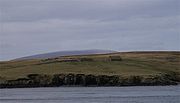
Bigga, Shetland
Encyclopedia
Bigga is an uninhabited island in the Sound of Yell between the Mainland and Yell in Shetland, Scotland
.


/Old Norse for "seaweed bay".
Cattle and sheep were formerly farmed here.
The island is split between the parishes of Delting, and Yell.
Bigga consists of Moine
bedrock of coarsely-crystalline gneiss
and quartzite
.
In the southern part of the island, there is an old well, chapel and burial ground. There is a small prehistoric cairn in the north of the island. In the north is the remains of Norrabister, the island's "settlement".
The Pribislaw, a 160-year-old German sailing vessel ran aground here in 1870. She had been one of many sailing boats that took German emigrants from Hamburg
to Victoria, in Australia
, around the middle of the 19th century. Moved to Lerwick, she was used as a store and workshop until the 1950s. In 2005 the remaining timbers were excavated and transported to Whittlesea
, Australia.
During World War II
, two sailors from neighbouring Yell wanted to return to their native island to celebrate Yule
(Christmas) during their shore leave. The weather was stormy and snowy and the usual ferry between the Mainland and Yell was not running, so they borrowed a friend's boat. Forced to land on Bigga, they sheltered in the bothy and danced, and played the fiddle in order to stay warm. They managed to reach Yell the next day.
Scotland
Scotland is a country that is part of the United Kingdom. Occupying the northern third of the island of Great Britain, it shares a border with England to the south and is bounded by the North Sea to the east, the Atlantic Ocean to the north and west, and the North Channel and Irish Sea to the...
.


Geography and geology
Just over 1000 metre long, Bigga is 78 hectare (0.301159683702177 sq mi) in size, and is 34 metres (112 ft) tall at its highest point. Bigga is a long thin island with a "head" and a "torso". The neck is formed by the bays of Wester Hevda Wick and Easter Hevda Wick, "hevda wick" being an anglicisation of the NornNorn language
Norn is an extinct North Germanic language that was spoken in Shetland and Orkney, off the north coast of mainland Scotland, and in Caithness. After the islands were pledged to Scotland by Norway in the 15th century, it was gradually replaced by Scots and on the mainland by Scottish...
/Old Norse for "seaweed bay".
Cattle and sheep were formerly farmed here.
The island is split between the parishes of Delting, and Yell.
Bigga consists of Moine
Moine
- Geography :* Des Moines, Iowa, formerly called Fort Des Moines .- Geology :* Moine Thrust Belt, a major geological feature in the north-west of Scotland....
bedrock of coarsely-crystalline gneiss
Gneiss
Gneiss is a common and widely distributed type of rock formed by high-grade regional metamorphic processes from pre-existing formations that were originally either igneous or sedimentary rocks.-Etymology:...
and quartzite
Quartzite
Quartzite is a hard metamorphic rock which was originally sandstone. Sandstone is converted into quartzite through heating and pressure usually related to tectonic compression within orogenic belts. Pure quartzite is usually white to gray, though quartzites often occur in various shades of pink...
.
History
It is thought that the name comes from the Old Norse bygdey meaning "island of the building", which may refer to an old structure.In the southern part of the island, there is an old well, chapel and burial ground. There is a small prehistoric cairn in the north of the island. In the north is the remains of Norrabister, the island's "settlement".
The Pribislaw, a 160-year-old German sailing vessel ran aground here in 1870. She had been one of many sailing boats that took German emigrants from Hamburg
Hamburg
-History:The first historic name for the city was, according to Claudius Ptolemy's reports, Treva.But the city takes its modern name, Hamburg, from the first permanent building on the site, a castle whose construction was ordered by the Emperor Charlemagne in AD 808...
to Victoria, in Australia
Australia
Australia , officially the Commonwealth of Australia, is a country in the Southern Hemisphere comprising the mainland of the Australian continent, the island of Tasmania, and numerous smaller islands in the Indian and Pacific Oceans. It is the world's sixth-largest country by total area...
, around the middle of the 19th century. Moved to Lerwick, she was used as a store and workshop until the 1950s. In 2005 the remaining timbers were excavated and transported to Whittlesea
Whittlesea
Whittlesea may mean:* Whittlesea, Victoria, a town some 40 km north of Melbourne.* City of Whittlesea, the local government area that contains it* Whittlesey in Cambridgeshire, England used to be known as Whittlesea...
, Australia.
During World War II
World War II
World War II, or the Second World War , was a global conflict lasting from 1939 to 1945, involving most of the world's nations—including all of the great powers—eventually forming two opposing military alliances: the Allies and the Axis...
, two sailors from neighbouring Yell wanted to return to their native island to celebrate Yule
Yule
Yule or Yuletide is a winter festival that was initially celebrated by the historical Germanic people as a pagan religious festival, though it was later absorbed into, and equated with, the Christian festival of Christmas. The festival was originally celebrated from late December to early January...
(Christmas) during their shore leave. The weather was stormy and snowy and the usual ferry between the Mainland and Yell was not running, so they borrowed a friend's boat. Forced to land on Bigga, they sheltered in the bothy and danced, and played the fiddle in order to stay warm. They managed to reach Yell the next day.

